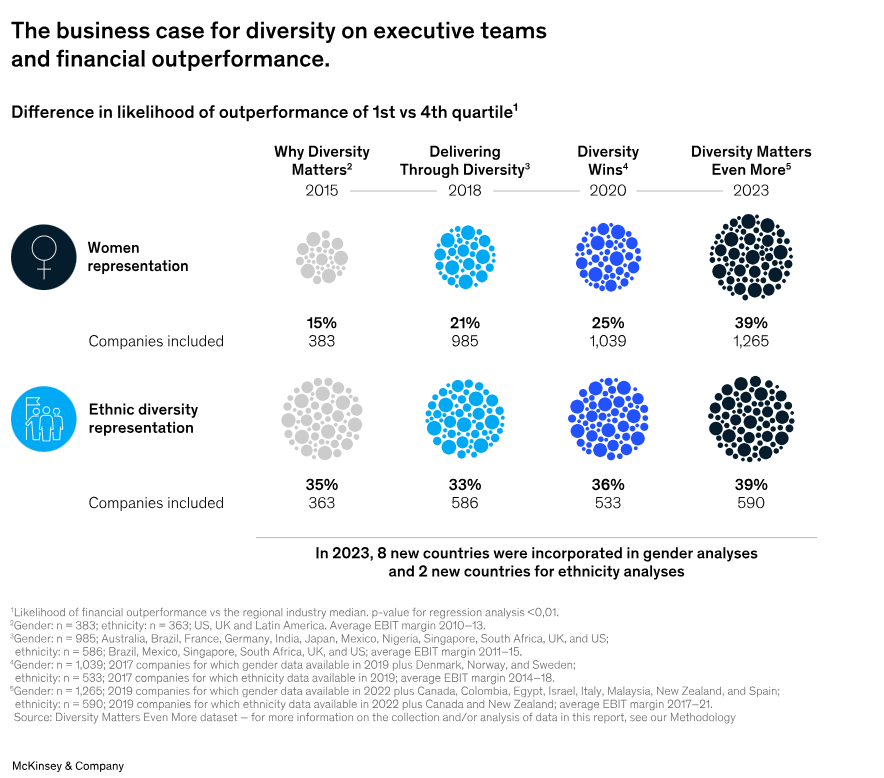Working in multicultural teams can be daunting and intimidating, yet many companies are increasingly open to welcoming people from diverse backgrounds. The question is, why?
Multicultural teams not only open the door to new markets but also drive business results. I am excited to share an insightful report from McKinsey that highlights these benefits.
Multicultural teams offer several significant benefits:
- Diverse Perspectives: Different cultural backgrounds bring varied viewpoints and approaches to problem-solving, fostering creativity and innovation.
- Enhanced Decision Making: Multiple perspectives lead to more thorough discussions and informed decisions, reducing the risk of biases and groupthink.
- Broader Market Insight: Cultural diversity within teams enables deeper understanding and connection with diverse customer bases and global markets.
- Increased Adaptability: Exposure to different cultures enhances team members' adaptability and resilience in navigating global business environments.
- Improved Communication Skills: Working in multicultural teams promotes the development of effective communication skills, including cross-cultural sensitivity and empathy.
- Personal Growth and Learning: Team members gain personal growth and learning opportunities by experiencing and appreciating different cultures firsthand.
- Higher Employee Engagement: Inclusive environments where diverse perspectives are valued often result in higher levels of employee engagement and satisfaction.
While multicultural teams are exciting to have, they come with a host of challenges, especially in a world facing crises such as political upheaval, economic shifts, war, and environmental issues. These factors contribute to strong opinions, leading to conflict, microaggressions, and impacts on performance.
In line with business excellence trends with a Six Sigma and IT background bent, I strive to connect everything with the business bottom line. The question is: do multicultural challenges impact business outcomes?
Yes, they do. When teams comprise people from diverse backgrounds, natural differences of opinion can lead to conflicts. Additionally, a lack of awareness about other cultures, personal boundaries, and dos and don’ts can create misunderstandings that directly affect business results.
Addressing these challenges proactively can turn potential pitfalls into strengths, ultimately enhancing team performance and business success.
Managing multicultural teams often presents challenging dilemmas for managers. Cultural differences can pose significant obstacles to effective teamwork, which may not be immediately apparent and can lead to unintended consequences, as illustrated in the case shared by the involved manager. In such situations, managers risk exacerbating issues rather than resolving them through intervention.
Effectively managing multicultural teams requires recognizing the underlying cultural roots of conflicts and intervening in ways that not only realign the team but also empower its members to independently tackle future challenges. This approach aims to restore team dynamics while fostering long-term resilience and cohesion.
Different cultures exhibit varying communication styles; while some prefer direct communication, others lean towards indirect approaches. Additionally, fluency in another language can pose challenges for acceptance in certain cultures. Furthermore, attitudes towards hierarchy and authority differ across cultures, contributing to diverse workplace dynamics. Conflicting norms for decision-making processes further underscore the complexities of managing multicultural teams.
How can you do to manage multicultural teams
- Adaptation: Some teams tackle challenges by adjusting practices or attitudes without altering team membership or assignments. This approach proves effective when team members recognize cultural differences and assume responsibility for reaching mutual accommodation. It minimizes the need for extensive managerial oversight and cultivates learning and innovation among team members who collaborate to preserve their distinct perspectives while integrating diverse approaches.
- Structural Intervention: Structural interventions involve purposeful reorganization or modifications aimed at reducing interpersonal friction or resolving conflicts within specific subgroups. For example, forming smaller working groups comprising individuals from varied cultural backgrounds can promote engagement and facilitate information sharing that might be hindered in larger settings. Effective structural interventions foster inclusivity and ensure that a range of perspectives contributes to team achievement.
- Managerial Intervention: Managers occasionally serve as mediators to address conflicts or establish norms within multicultural teams. This direct approach becomes necessary to resolve impasses or promptly address cultural misunderstandings. By setting clear guidelines and facilitating constructive dialogue, managerial intervention enhances team unity and facilitates effective problem-solving without external escalation. Although rare, team members may opt to leave when persistent cultural differences impede collaboration. In project-based teams, members may endure challenges until project completion, whereas in permanent teams, exits are a last resort to maintain team dynamics and productivity. Proactively understanding and managing cultural dynamics can mitigate the need for exits by fostering an inclusive environment where diverse perspectives contribute to organizational success.
Embracing multicultural teams offers immense benefits once you learn to inspire effective collaboration while respecting and embracing differences.
Let me share some interesting insights from UAE perspective
Based on more than 14 years of living and working experience in the UAE with over 150 companies from 30+ countires and thousands of professionals from around the globe and the significant exposure to various cultures, let me share some interesting insights, especially for companies aspiring to expand in the UAE and the Middle East.
Considering prayer times when scheduling meetings demonstrates respect for the personal space professionals need within the working environment. This consideration should also extend to planning training sessions or any events. Being aware of long holidays, the month of Ramadan, and respecting modesty are highly appreciated.
The UAE is very welcoming, and the people here are incredible hosts who love to treat their guests wholeheartedly, often starting with offering special coffee (kawa) and dates. Even if coffee is not your preferred beverage, respecting the hospitality and appreciating the welcoming gesture is important. It's good to accept it and have a sip. Whether you drink it fully or not, showing appreciation for their kindness builds strong, respectful relationships.
Respecting personal space is important, and it's considerate to let the other person initiate a handshake or hug. Wait for their cue and refrain from taking the lead. If they choose not to shake hands, please respect their decision without judgment. Genuine connections start with respect, not judgment.
Another important consideration is seating arrangements. Please be mindful of where you sit in the meeting room. Hierarchical norms are highly valued here, so allow the meeting leader to choose their seat before selecting yours.
The UAE is a place where people from various nationalities come together to work harmoniously. English may not be the first language for many, so using simple and understandable English is more crucial than showcasing language proficiency.
Instead of pushing for strict deadlines, demonstrating openness to new ideas, flexibility to accommodate changes, and maintaining buffers for new demands is highly appreciated. These practices not only foster long-term relationships with clients but also promote adaptability and collaboration in project management.
A small effort to explore without judgment, an intention to see beyond borders, and a respect for differences can take teams to great heights, lead businesses to sustainable success, and help professionals achieve exceptional growth.
Author / Contributor
Neetu Choudhary
- Course Director for Essential Skills for New Managers Course
- UAE’s Top Professional Development Coach, Keynote Speaker, Author, Corporate Trainer, Executive Coach for Managers, and Idea Presentation Advisor

Neetu brings neuroscience , behavioural science, and science-based studies along with Six Sigma-based structured approach to professional development in its most simple, practical, and interesting form. With more than 22 years of corporate experience, Neetu helps organizations improve revenue by upskilling employees and inspiring them. She has won various awards, including Best Public Speaker 2022 by Global Women Leadership Awards, Life Coach of the Year 2021 by Lifestyle Fiesta, and Top-Rated Speaker by ISACA USA for many years. Having won The Brand Ambassador Award, the CR Champion Award, and the Self-Development Award by DP World, she has spoken across the globe, been featured in international magazines, and published more than 100 articles.
As an author, speaker, and thought leader, Neetu is an idea presentation expert, keynote speaker, strategic partner for startups, corporate trainer, and professional development coach. Neetu is a ASQ Certified Six Sigma Black Belt, EFQM certified Assessor, ISACA CGEIT, Certified NLP, EI, leadership coach. She is team leader and Sr. Assessor for various international business excellence awards.
Request for Brochure - Essential Skills for New Managers Course
Available In-Person or In-House
For further questions and/or information please contact us at info@cconnection.org